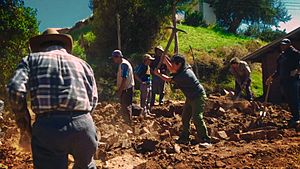Minka (communal work) facts for kids

Mink'a (also spelled Minka or Minga) is an old tradition from the Inca Empire. The word comes from the Quechua word minccacuni, which means "asking for help by promising something." It's a way for communities to work together voluntarily. People help each other on projects that benefit everyone, like building public spaces or helping a family.
This tradition is still practiced in several Latin American countries today. Mink'a can involve different kinds of community work. For example, people might build public buildings or help with big projects. It can also be used to help a single person or family, like when they need help harvesting potatoes or other crops. Usually, people don't get paid for their work during a mink'a. It's seen as a way to contribute to the community. It's almost like a local tax paid with labor instead of money. Mink'a is mainly found in Colombia, Peru, Ecuador, Bolivia, Chile, and Paraguay.
Mink'a in Peru
In Peru, mink'a is strongly connected to the ancient indigenous cultures. It is still practiced in communities where people have mixed heritage (called mestizo) and in farming communities (called campesino) in the Andes mountains. In these places, the idea of helping each other (called ayni) guides how community work is done.
For example, a dozen neighbors might work together on farms. They use their own tools and local materials to build things like a community kitchen. During the time of the Inca Empire, mink'a was the main way people worked within their local groups, called ayllu. It was also used for bigger projects that helped the whole society, known as mit'a.
Families would help build homes and irrigation canals. They also helped disabled people with their farm work. They even cared for orphans and the elderly. Later, many people moved from the mountains to cities on the Peruvian coast. Because of this, mink'a also became common in coastal areas. It's especially useful in smaller communities where paying with labor is easier than paying with money for community projects.
See also
 In Spanish: Minka para niños
In Spanish: Minka para niños

